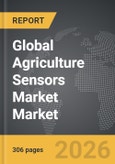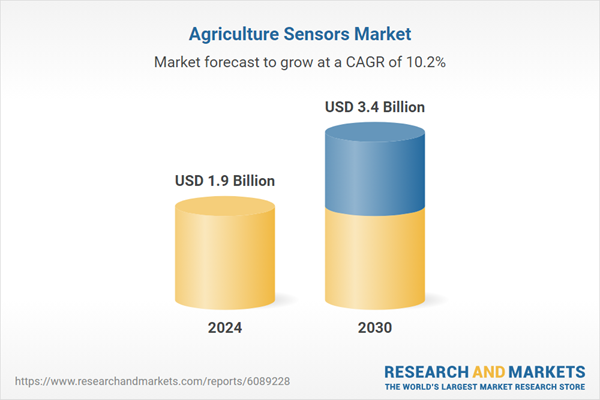Global Agriculture Sensors Market - Key Trends & Drivers Summarized
Why Are Agriculture Sensors Central to Precision Farming and Data-Driven Agricultural Transformation?
Agriculture sensors are foundational to the digitalization of farming, enabling real-time monitoring, data collection, and decision-making across soil health, crop performance, environmental conditions, and equipment operations. These devices - ranging from soil moisture probes and nutrient sensors to weather stations, drones, and livestock trackers - are key enablers of precision agriculture, allowing farmers to optimize input use, reduce waste, and improve yield consistency.As global agriculture faces mounting pressure to boost productivity while conserving resources and reducing environmental impact, sensors are helping transition farming from intuition-based to data-led operations. Their integration into connected farm ecosystems is revolutionizing how growers manage variability, forecast conditions, and automate interventions - thereby enhancing both efficiency and resilience.
How Are Advances in Sensor Miniaturization, Connectivity, and Analytics Enhancing On-Farm Applications?
Innovations in IoT-enabled sensors, wireless communication protocols (such as LoRaWAN, NB-IoT, and Bluetooth Low Energy), and energy-efficient chipsets are making sensors more accessible, cost-effective, and scalable. Sensors embedded in fields, greenhouses, machinery, and irrigation systems are now capable of generating continuous, high-resolution data streams with minimal human intervention.AI-powered analytics platforms and edge computing are enhancing the value of sensor data by enabling predictive insights, real-time alerts, and automation triggers. Soil sensors now deliver granular data on pH, salinity, temperature, and nutrient levels; weather sensors track hyperlocal climate patterns; and multispectral crop sensors support early disease detection, growth tracking, and yield estimation. These capabilities are driving smart input application, precision irrigation, and autonomous equipment guidance.
Which Crop Systems and Regional Markets Are Leading the Adoption of Agriculture Sensors?
High-value crop systems such as horticulture, viticulture, greenhouse farming, and row crops like maize, wheat, and soybeans are early adopters, where sensor-driven optimization directly translates to economic and environmental gains. Livestock operations are also integrating sensors for animal health, location tracking, and behavioral analysis to support welfare and productivity.North America and Western Europe are the most mature markets, supported by strong agri-tech ecosystems, high farm digitization rates, and early adoption of precision agriculture practices. Asia-Pacific, particularly in China, Japan, and Australia, is experiencing fast-paced growth due to rising food security concerns and smart farming investments. In Latin America and Africa, adoption is being accelerated by agri-tech startups, government-backed programs, and international development agencies focusing on smallholder digitization.
How Are Sustainability Goals, Regulatory Pressures, and Value Chain Integration Shaping Market Expansion?
Sustainability imperatives - such as reducing water consumption, minimizing chemical runoff, and improving soil carbon management - are pushing farms to adopt sensors for precision monitoring and reporting. Climate-smart agriculture frameworks and regenerative farming initiatives increasingly require data-backed verification, where sensors provide measurable insights into resource use and environmental impact.Regulatory developments, particularly those tied to carbon accounting, nitrate usage, and water rights, are reinforcing the role of sensors in compliance and traceability. Simultaneously, integration with agri-input suppliers, food processors, and traceability platforms is creating closed-loop value chains where sensor data feeds into crop contracts, input optimization, and ESG reporting, further elevating their strategic utility.
What Are the Factors Driving Growth in the Agriculture Sensors Market?
The agriculture sensors market is expanding rapidly due to rising demand for precision agriculture, growing connectivity infrastructure, and increased awareness of data's role in improving yield, sustainability, and profitability. Key drivers include miniaturization, affordability, AI integration, and cross-platform compatibility. The market is also benefitting from public and private sector investments in agri-digital transformation, climate-resilient agriculture, and smart rural infrastructure.Looking ahead, the pace of market development will depend on how effectively sensor ecosystems scale across farm sizes, geographies, and use cases - while maintaining accuracy, interoperability, and cost-efficiency. As agriculture moves deeper into the digital era, could sensor technologies become the essential intelligence layer powering the future of regenerative, transparent, and autonomous food production systems?
Report Scope
The report analyzes the Agriculture Sensors market, presented in terms of market value (US$). The analysis covers the key segments and geographic regions outlined below:- Segments: Type (Dairy Management, Soil Management, Climate Management, Water Management, Smart Green House, Other Types); Application (Location Sensors, Humidity Sensors, Electrochemical Sensors, Mechanical Sensors, Airflow Sensors, Pressure Sensors, Other Applications).
- Geographic Regions/Countries: World; United States; Canada; Japan; China; Europe (France; Germany; Italy; United Kingdom; Spain; Russia; and Rest of Europe); Asia-Pacific (Australia; India; South Korea; and Rest of Asia-Pacific); Latin America (Argentina; Brazil; Mexico; and Rest of Latin America); Middle East (Iran; Israel; Saudi Arabia; United Arab Emirates; and Rest of Middle East); and Africa.
Key Insights:
- Market Growth: Understand the significant growth trajectory of the Dairy Management segment, which is expected to reach US$759.4 Million by 2030 with a CAGR of a 8.3%. The Soil Management segment is also set to grow at 8.5% CAGR over the analysis period.
- Regional Analysis: Gain insights into the U.S. market, valued at $522.7 Million in 2024, and China, forecasted to grow at an impressive 13.6% CAGR to reach $691.8 Million by 2030. Discover growth trends in other key regions, including Japan, Canada, Germany, and the Asia-Pacific.
Why You Should Buy This Report:
- Detailed Market Analysis: Access a thorough analysis of the Global Agriculture Sensors Market, covering all major geographic regions and market segments.
- Competitive Insights: Get an overview of the competitive landscape, including the market presence of major players across different geographies.
- Future Trends and Drivers: Understand the key trends and drivers shaping the future of the Global Agriculture Sensors Market.
- Actionable Insights: Benefit from actionable insights that can help you identify new revenue opportunities and make strategic business decisions.
Key Questions Answered:
- How is the Global Agriculture Sensors Market expected to evolve by 2030?
- What are the main drivers and restraints affecting the market?
- Which market segments will grow the most over the forecast period?
- How will market shares for different regions and segments change by 2030?
- Who are the leading players in the market, and what are their prospects?
Report Features:
- Comprehensive Market Data: Independent analysis of annual sales and market forecasts in US$ Million from 2024 to 2030.
- In-Depth Regional Analysis: Detailed insights into key markets, including the U.S., China, Japan, Canada, Europe, Asia-Pacific, Latin America, Middle East, and Africa.
- Company Profiles: Coverage of players such as ALNET (Pty) Ltd, American Nettings & Fabric Inc., Arrigoni S.p.A., Berry Global Inc., Cittadini S.p.A. and more.
- Complimentary Updates: Receive free report updates for one year to keep you informed of the latest market developments.
Some of the 48 companies featured in this Agriculture Sensors market report include:
- Acclima Inc.
- Ag Leader Technology
- AgJunction Inc.
- AGCO Corporation
- Arable Labs
- Auroras
- CropX Inc.
- Deere & Company (John Deere)
- Edyn
- FarmSense
- FreeWave Technologies
- Gamaya
- Libelium Comunicaciones
- METER Group
- Monnit Corporation
- Omega Engineering
- Pessl Instruments GmbH
- Phytech Ltd.
- Pixxel
- Pycno Industries
This edition integrates the latest global trade and economic shifts into comprehensive market analysis. Key updates include:
- Tariff and Trade Impact: Insights into global tariff negotiations across 180+ countries, with analysis of supply chain turbulence, sourcing disruptions, and geographic realignment. Special focus on 2025 as a pivotal year for trade tensions, including updated perspectives on the Trump-era tariffs.
- Adjusted Forecasts and Analytics: Revised global and regional market forecasts through 2030, incorporating tariff effects, economic uncertainty, and structural changes in globalization. Includes historical analysis from 2015 to 2023.
- Strategic Market Dynamics: Evaluation of revised market prospects, regional outlooks, and key economic indicators such as population and urbanization trends.
- Innovation & Technology Trends: Latest developments in product and process innovation, emerging technologies, and key industry drivers shaping the competitive landscape.
- Competitive Intelligence: Updated global market share estimates for 2025, competitive positioning of major players (Strong/Active/Niche/Trivial), and refined focus on leading global brands and core players.
- Expert Insight & Commentary: Strategic analysis from economists, trade experts, and domain specialists to contextualize market shifts and identify emerging opportunities.
Table of Contents
Companies Mentioned (Partial List)
A selection of companies mentioned in this report includes, but is not limited to:
- Acclima Inc.
- Ag Leader Technology
- AgJunction Inc.
- AGCO Corporation
- Arable Labs
- Auroras
- CropX Inc.
- Deere & Company (John Deere)
- Edyn
- FarmSense
- FreeWave Technologies
- Gamaya
- Libelium Comunicaciones
- METER Group
- Monnit Corporation
- Omega Engineering
- Pessl Instruments GmbH
- Phytech Ltd.
- Pixxel
- Pycno Industries
Table Information
| Report Attribute | Details |
|---|---|
| No. of Pages | 306 |
| Published | February 2026 |
| Forecast Period | 2024 - 2030 |
| Estimated Market Value ( USD | $ 1.9 Billion |
| Forecasted Market Value ( USD | $ 3.4 Billion |
| Compound Annual Growth Rate | 10.2% |
| Regions Covered | Global |









